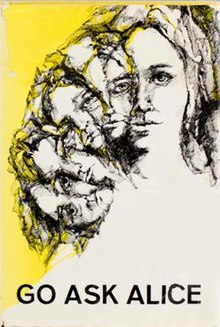Go Ask Alice

Dust jacket of Prentice Hall first edition, 1971
|
|
| Author | Anonymous |
|---|---|
| Language | English |
| Genre | Young adult fiction |
| Published | 1971 |
| Publisher |
Prentice Hall (1st edition) Simon & Schuster (later editions) |
| Media type | Print (hardcover and paperback), ebook |
| ISBN | |
| OCLC | 164716 |
| LC Class | PZ7 .G534 |
Go Ask Alice is a 1971 fiction book about a teenage girl who develops a drug habit at age 15, runs away from home, and eventually dies of a drug overdose. Attributed to "Anonymous", the book is in diary form, and was originally presented as being the edited "real diary" of the unnamed teenage protagonist. Questions about the book's authenticity and true authorship began to arise in the late 1970s, and it is now generally viewed as a work of fiction written by Beatrice Sparks, a therapist and author who went on to write numerous other books purporting to be real diaries of troubled teenagers. Some sources have also named Linda Glovach as a co-author of the book.
Intended for a young adult audience, Go Ask Alice became a widely popular bestseller. It was initially praised for conveying a powerful message about the dangers of drug abuse, but more recently has been criticized as poorly written anti-drug propaganda and also as a literary hoax. Nevertheless, its popularity has endured, and as of 2014 it had remained continuously in print since its publication over four decades earlier. Go Ask Alice has also ranked among the most frequently challenged books for several decades due to its use of profanity and explicit references to sex and rape, as well as drugs.
The book was adapted into the 1973 television film Go Ask Alice, starring Jamie Smith-Jackson and William Shatner. In 1976, a stage play of the same name, written by Frank Shiras and based on the book, was also published.
The title was taken from a line in the 1967 Grace Slick-penned Jefferson Airplane song "White Rabbit" ("go ask Alice/when she's ten feet tall"); the lyrics in turn reference scenes in Lewis Carroll's 1865 novel Alice's Adventures In Wonderland, in which the title character Alice eats and drinks various things, including a mushroom, that make her grow larger or smaller. Slick's song is understood as using Carroll's story as a metaphor for a drug experience.
...
Wikipedia
